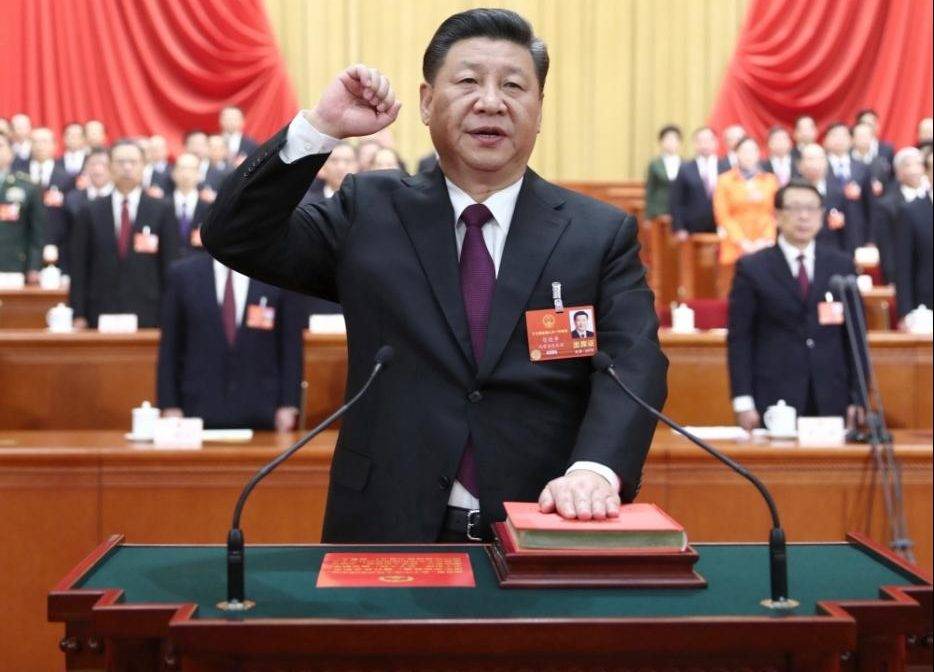The Chinese president lauds the end of ‘chaos’ in Hong Kong and refuses to rule out force to take Taiwan…reports Asian Lite News
China’s Communist Party has kicked off its twice-in-a-decade Congress, with President Xi Jinping calling for faster military growth, defending Beijing’s “zero-COVID” approach, and refusing to rule out the use of force to take Taiwan.
The week-long meeting is the CCP’s most important political event and Xi is expected to receive a third five-year term, breaking with recent precedent and establishing him as arguably the most powerful Chinese politician since party founder Mao Zedong.
In a lengthy report at the Congress’s opening, Xi extolled the achievements of the past five years and said the party would strive to meet its modernization goals, including the building of a world-class military.
“The rejuvenation of the Chinese nation is an irreversible, historical course,” he said to the more than 2,000 delegates attending the opening, held in the Great Hall of the People that overlooks Tiananmen Square in the centre of Beijing.
He called for accelerating military and technology development to propel this rejuvenation and said the People’s Liberation Army, the world’s second-largest military after the United States, needs to “safeguard China’s dignity and core interests”.
“We will work faster to modernise military theory, personnel and weapons,” Xi said in the nearly two hour speech, which was punctuated by brief bursts of applause from the masked delegates. “We will enhance the military’s strategic capabilities.”
The Chinese leader also hailed the end of what he described as the “chaos” in Hong Kong, where a harsh and wide-ranging crackdown on pro-democracy protesters has drawn criticism from Western governments.
“The situation in Hong Kong has achieved a major transition from chaos to governance,” he said, going on to pledge a “major struggle against separatism and interference” in the self-ruled island of Taiwan.
The delegates responded with loud applause.
The “Taiwan issue… must be resolved by Chinese people alone”, Xi went on, condemning “external forces” interfering in the affairs of the island, which Beijing claims as its own.
“We will adhere to striving for the prospect of a peaceful reunification with the greatest sincerity and greatest efforts, but will never commit to abandoning the use of force, and reserve the option to take all necessary measures,” he said.
He mentioned “safety” or “security” 73 times, compared with 55 times in 2017, and said China will strengthen its ability to build a strategic deterrent capability.
By comparison, he said “reforms” 16 times in the televised speech, far fewer than the 70 mentions five years ago.
The Chinese leader also said the Communist Party, which has 96 million members, “has won the largest battle against poverty in human history” and said his long-running crackdown on corruption had put an end to “serious latent dangers” within the party and military.
On the economic front, he reiterated support for the private sector and allowing markets to play a key role.
“We must build a high-level socialist market economic system … unswervingly consolidate and develop the public ownership system, unswervingly encourage and support the development of the private economy, give full play to the decisive role of the market in the allocation of resources, and give better play to the role of the government,” he said.
The son of a Communist Party revolutionary, Xi has reinvigorated a party that had grown deeply corrupt and increasingly irrelevant, expanding its presence across all aspects of China, with himself officially its “core”. Xi did away with presidential term limits in 2018, clearing the way for him to break with the precedent of recent decades and rule for a third five-year term, or longer.
The Congress is expected to reconfirm Xi as party general secretary, China’s most powerful post, as well as chairman of the Central Military Commission. Xi’s presidency is up for renewal in March at the annual session of China’s parliament.
In the run-up to the Congress, the Chinese capital stepped up security and COVID-19 curbs, while steel mills in nearby Hebei province were instructed to cut back on operations to improve air quality, an industry source said.
The day after the Congress ends on Saturday, Xi is expected to introduce his new Politburo Standing Committee, a seven-person leadership team. It will include the person who will replace Li Keqiang as premier when he steps down from that post in March after serving the maximum two terms.
The weeklong Congress is the 20th in the history of the century-old party, which has ruled China for more than 70 years.
ALSO READ-Danger signal from Russia on Xi Jinping

